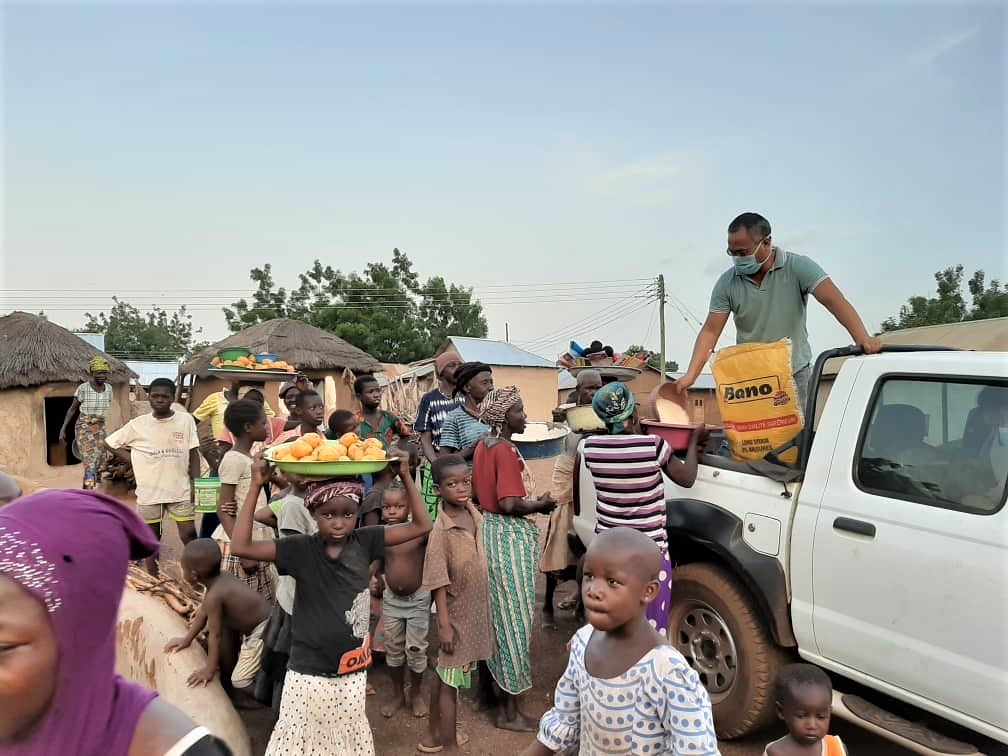Pure devotion: Ghanaian child and widow care
By Tianna Haas | Ghana in West Africa

Fela gives food to widows in Gushegu.
Vanlalfela “Fela” and Lalhlupuii Hnialum have ministered to a substantial number of widows and children in Gushegu, Ghana, leading up to the COVID-19 pandemic, and they are eager to return.
The couple, who are from Mizoram, India, have provided food relief to widows who have been cast out of their communities upon their husbands’ deaths. The widows mainly gather food by sifting discarded millet at the local marketplace.
Fela, who is sent by Lairam Isua Krista Baptist Church, said: “Their life is so difficult … Lots of people come to the weekly market, and after people come, the widows will sweep the ground and collect anything that resembles food stuff. They take water in a bucket, pour all the food stuff together, find whatever floats, and sift it out. That’s what they eat.
“Their life is very, very difficult. When they started coming to my house and we asked for their prayer requests, they always said we need to pray for their food. So, every Wednesday night, we pray for their food.”
Customarily, families ask religious leaders the cause of a man’s death, and at these times they may blame the widows, deeming them witches.
Gushegu has allowed the exiled widows to settle in communal housing, labelled ‘witches camps.’ These women are primarily in their 60s and 70s and without a source of income.
Fela said, “When [the widows] came to Gushegu, they came into the church. Eventually, they became Christians. When we got to know about their living situation, we tried to help them. We prayed for them. We invited them for dinner or lunch. And they started coming to our house, and we started having prayer nights every Wednesday … We’ve talked with local church leaders about finding or building a house for them.”
Fela began to tell others about their plight, and generous donations came in, blessing the widows with food and necessities.
The coronavirus required the Wednesday prayer meetings to stop, but the widows continued to visit Fela’s family. He said: “People haven’t taken any precautionary measures. I explained to them that when they go to market, they need to know that a virus is spreading around Ghana.

The widows in prayer at Fela's home.
“They say the virus will never come to Gushegu because the religious leaders have made animal sacrifices to protect the whole town. They truly believe that.
“All of my friends keep coming to the house to greet me. I explained to them that they should always keep social distance even when they go out of their place. It seems they do not actually understand the severity of COVID-19 … Greetings are very important in their culture.
“I told the widows that we need to leave the town earlier than we’d planned for precautionary reasons. We bought a month’s worth of food for all of [the widows].”
As Fela and his family said goodbye to the widows in mid-April, they entrusted their care to another local church leader with a heart for widows. They pray the Lord will give others a heart to serve them.
They’ve also been separated from a young believer, Amin*, who came to faith through their kids’ club, where Fela and his team teach children Bible stories every Saturday.
The neighbourhood where the Hnialums live has been resistant to the gospel, but Amin, despite his family’s disapproval, has shown signs of transformation and dedication to Christ.
Many children in the kids’ club have attended Fela’s church, but as they grow older, they don’t want to be seen there and feel they’re treated differently by friends. Amin has taken a different path with true faith.
Fela said: “Even during Ramadan, he came to our house and did not fast. So, when we talked to him, he told us that his whole family knew he didn’t fast during Ramadan, because he told his parents he became a Christian … We really pray for him that he will remain strong and keep following Christ.”
"We really pray for him that he will remain strong and keep following Christ."
Fela connected Amin to another missionary working in Gushegu to fellowship with while they’re away and is confident she will disciple him.
James 1:27 says, “Religion that God our Father accepts as pure and faultless is this: to look after orphans and widows.” Likewise, Fela’s ministries to those unaccepted by communities and earthly families is genuine devotion to Christ’s commission. He hopes to return soon and continue inviting this community to embrace the gospel.
Will you join him? Contact us today to find out how you can serve with SIM.
Pray for:
• Leaders in the local churches in Gushegu to welcome and support widows.
• Amin to lean on Jesus and mature in his faith despite his family’s discouragement.
• Fela and Lahlupuii as they travel back to Mizoram.
*Name changed for security.
Related stories

New Uruguay mission school has vision for world missions
SIM has a commitment to see Uruguay reached for Christ. And through key partnerships with like-minded organisations, a new missionary training school called Todos Oiran (All Will Hear) is opening its doors in Montevideo, Uruguay.

